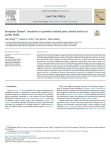Zhang H., Potts S.G., Breeze T., Bailey A. (2018). European farmers’ incentives to promote natural pest control service in arable fields. Land Use Policy, 01/11/2018, vol. 78, p. 682-690.
https://doi.org/10.1016/j.landusepol.2018.07.017
https://doi.org/10.1016/j.landusepol.2018.07.017
| Titre : | European farmers’ incentives to promote natural pest control service in arable fields (2018) |
| Auteurs : | H. Zhang ; S.G. Potts ; T. Breeze ; A. Bailey |
| Type de document : | Article |
| Dans : | Land Use Policy (vol. 78, November 2018) |
| Article en page(s) : | p. 682-690 |
| Langues : | Anglais |
| Langues du résumé : | Anglais |
| Catégories : |
Thésaurus IAMM LUTTE ANTIRAVAGEUR ; LUTTE INTEGREE ; COMPORTEMENT DES AGRICULTEURS ; PRISE DE DECISION ; POLITIQUE AGRIENVIRONNEMENTALE ; PAYS DE L'UNION EUROPEENNECatégories principales 06 - AGRICULTURE. FORÊTS. PÊCHES ; 6.6 - Technique Agricole (sols, engrais, mécanisation) |
| Résumé : | Integrated pest management (IPM) is widely encouraged among the European Union (EU) member states. The successful adoption of IPM techniques requires strong farmer motivation and participation. However, few studies have explored EU farmers’ incentives to promote natural enemies of crop pests in the fields, and none have addressed how this could be influenced by farmers’ recognition of natural pest control service. Based on interviews among arable farmers involved in an EU funded agri-environmental project across seven member states, natural pest control was perceived to be a less important contributor to crop production than soil fertility and pollination. Preferences toward managing semi-natural habitats for natural enemies were also relatively low, while insecticides were commonly used among participants. Ordinal logistic regression indicates that farmers’ decision to promote natural pest control was positively associated with the perceived importance of this ecosystem service for crop production. However, they expressed a relatively low confidence in the pest control efficacies of natural enemies compared with insecticides, especially under high pest damage levels. Farmers with greater income have more financial flexibility to adopt either pest control method. The environment surrounding a farm may also influence its owner’s willingness to promote natural pest control. |
| Cote : | Réservé lecteur CIHEAM |
| URL / DOI : | https://doi.org/10.1016/j.landusepol.2018.07.017 |







